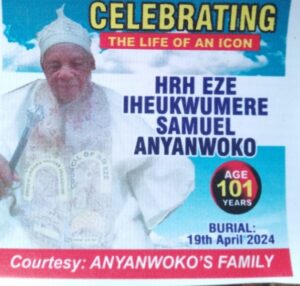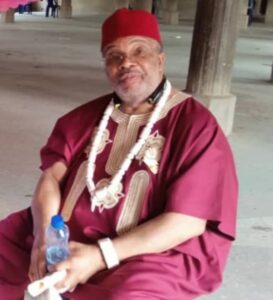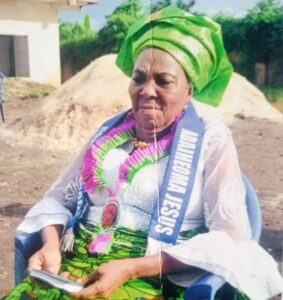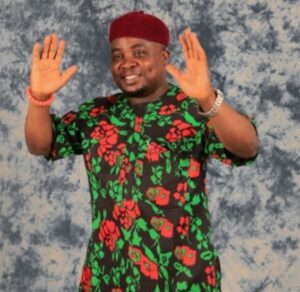Anniversary edition: The great Oghu Debate.
8 min read
(Is Oghu Festival a gift from the Devil or God?)
Mr Paul Chinedu Iwuagwu used to be a well known powerful native doctor whose powers can correctly predict the future. Native Doctor PC Iwuagwu a he was known had the marine gift of the management of spiritual crisis, fortune telling and the healing of madness and other spiritually related ailments. Iwuagwu did not only heal his patients, he also made some of them rich, assisted others secure rich and balanced marriage partners. Many poor men who visited this African witch doctor and mysterious human dynamo ended up being rich as they achieved their overnight financial success almost immediately and without delay.

In the famous spiritual chambers of Mr Paul Iwuagwu, the lame walked, the blind saw, the weak said “am strong” and instantly became strong. The sycophants of his era sang his praises to unimaginable levels and some even nicknamed him Destiny Changer. As all these activities were taking place, Iwuagwu was calmly smiling his way to the bank as he became stupendously rich. Besides being rich, he was a feared and respected native doctor whose popularity soared beyond his imagination. He made fame, fortune and those who mattered in the society were always seen struggling for space at the dead hours of the night to secure both his spiritual and physical attention. Mr Paul Chinedu Iwuagwu was indeed a human-dynamo with highly effective spiritual powers that made the impossible possible.
Using some of the proceeds from his juju practice, he contributed immensely to the development of his community in diverse ways. His spirit of charity and elevation of peace in the community made people to describe him as God-sent. No doubt, Iwuagwu was using the power from the marine kingdom to perform the magical activities that gave him fame and fortune.
In the process of time, miraculous Christianity started to have a deep grip in the minds of the people in and around the community where Iwuaagwu practiced his magic. In fact, most churches started to perform miracles in the name of Jesus. “The lame walked, the blind saw, the weak said “am strong” and instantly became strong. The sycophants of this era sang the praises of these churches to unimaginable levels.
v
As these churches made miracles take place, Iwuagwu became restless and uncomfortable as he saw his patrons turn to God. Moved by the activities of these churches and the rate his patrons were turning to God, Mr Paul Chinedu Iwuagwu strongly started to nurse a suspicion that sooner or later, he may be totally knocked out of business if a radical approach was not employed to safe his ministry.
Mr Iwuagwu, the controversial fortune teller and businessman took a leap out of his community and settled in another town. In his new abode, he changed the signpost of his herbal home from the Mystic Home of Paul Iwuagwu to St Paul’s Christian Revival Ministry. He only changed the name and method but continued using the powers from the marine world that made him live large. Only a few weeks from the date of his new mission, miracle seekers started to flood his “church” as if Christ himself had arrived in the world for the second time. He preached peace, preached love and always warned his followers to avoid anything that would put them into trouble. On no day he directed his people to fight, steal or commit any abominable act as forbidden by the land. His antics got directly to the hearts of the people who took time to defend him at any given time with serious claims that he was totally of God.
Try to note here that Mr Paul Chinedu Iwuagwu only redefined the outward appearance of his marine ministry in order to successfully launch a victory in the hearts of his followers who were only out to seek miracles without a proper examination and reexamination of the source of the miracles. His followers, out of ignorance, made people believe that he was a harmless man of God who preached peace and love. Their reason was that they never saw their General Overseer practice occultism or anything contrary to the recommendations of the Bible.
Questions to be asked here are as follows: does the mere changing of a name on the signpost from Paul Iwuagwu’s Mystic Home to St Paul’s Christian Revival Ministry mean that Iwuagwu has repented? Preaching of peace, love and urging people not to fight represents the good ways of life but what if it is at variance with God of the Bible?
The above scenario represents what the Oghu has become in the minds of the people today especially those who claim that it is not pagan. Today, people pray and at times call some clergymen to bless Oghu for them before they start to dance. Does that in any way make Oghu a Christian festival or a spiritually harmless fun? Does the dressing of Bob Risky as a woman while he is indeed a man, in any way make him a woman? Does the invitation of priests to pray during the celebration of the festival make it a Christian festival?
Over the years, there have been some debates and discourses to establish the Christian connotation or pagan origin of Oghu festival among communities that celebrate it. Some people have made some reasonable points from the both sides of the debate while others who maintained their neutrality also made some points. Many people who spoke to Umuaka Times about this culture seriously maintained that the festival has nothing to do with pagan practice or idol worship.
Nze Marcel Ahunanyaekwe Obiagwu, the Chief Priest of Uhu Eziokwu Deity in Umuaka
who described himself as the first son of Umuaka wondered why people could link the Oghu Culture to paganism while it is the only culture that unites both the pagans and Christians in Umuaka and beyond. According to the chief pries “Oghu is not a pagan festival. It has been with us before Christianity came. People call oghu a pagan festival in order to destroy our culture. Oghu is what we saw in the hands of our forefathers. Christianity just came to destroy it the way it has totally destroyed our way of reasoning and dong things here in Africa,.”

Chief Aloysius Iwuajoku popularly known as Chinedu Onye Ntunu, described oghu culture as something unique and inspiring. According to him, it was women that brought the culture to Umuaka but men had to take it away from them because of some certain reasons concerning their health. “Oghu dance is a totally rigorous activity that requires energy. Men took it from women because of their monthly periods. In those days, some women while dancing Oghu would be bleeding and to save them from the embarrassment, men had to take over the dance from them.”
When Umuaka Times asked him to explain why people associate the culture with devilishness, he told the newspaper that it was because of some penalties the festival was known for while punishing those who violate the rules of the game.“For instance, when someone goes against any of the rules and laws guiding the culture, he is meant to pay some certain amount of money or he buys a goat for the community. Chief Iwuajoke sees nothing wrong in imposing penalties on the defaulters of the laws of the culture. According to him, even churches have their own laws and penalties as well.
On the origin of the culture, Chief Iwuajoke told Umuaka Times that the oghu dance was being danced in the river before it was brought out to the outside world by women.. The Umuaka Times reporter who interviewed the chief then asked him if the association of the culture with marine spirit does not mean it came from the marine spirit, he smiled and said no. “Even Jesus was baptized in the river. Does that man him an onye mmiri?”

Mr Eddy Nwokem, a native of Amakor has a different view. According to him, both Oghu and Christmas came from God in Heaven. “God created man, man created culture. People refer to Oghu as a pagan culture because of the behavior of some people during the festival. Many people who condemn the festival are the same people who so much love the festival.”

Greg Okoro, an American based professor of Umuaka origin, is neither here nor there. Hear him.
“Oghu is NOT a pagan practice. In fact I would ascribe it to Thanksgiving. Everyone gives Thanks to someone – pagans to their Agbara or personal Ikenga; & Christians to their God. Oghu is a time we to take stock of our blessings and hence thank our personal & collective Chi, by offering our deep appreciation. Oghu is a festival of Thanksgiving. It is our annual rest period following a period of toiling in the farms and plantations. We can think of Oghu as an intersection or common ground wherein Christianity and Paganism accommodate each other. We must do whatever we can to preserve and possibly expand that common ground.”
Still speaking on the subject of Oghu, Chief Ben Durugbor, an Oghu Elder from Ugbele tried his best to put things in historical perspective. According to him, “The Oghu Festive Dance reached the Isu Clan from Oru Clan, i.e. Oguta area, namely Oguta 1 and Oguta 2 (Mbele Oru, Nkweshi, Nnebukwu, Osuobodo, Izombe, etc).” Chief Durugbor described Oghu as a social event.”Like other social events, it is organized within the cultural environment. Primitively, the setting was the practice of paganism by our forebears. Nowadays, paganism is no more. Instead, Christianity has set in and has actually affected the way social life is being organized.
From the views of Chief Durugbor, one may conclude that the Chief has indeed admitted that the beginning of the culture had some pagan orientations and beliefs but today it has changed. The question now is; did the culture indeed change? It really looks like Native Dr
Iwuagwu who changed the name of his mystic home to a Christian name, therby making people to believe that he was a pastor.
Chief Durugbor concluded his position thus: “I belong to the Christian era. I have never witnessed anything devilish being done in our execution of the festivities. In Ugbele-Akah the Association of Isi-Oghu titleholders normally book Holy Mass in our local Church at the onset of Oghu every year. Check it out. In January-February of the year 2003, while on Christian Pilgrimage I observed cultural practices in Jerusalem. Children wear masks and move around families to collect candies. In USA around November a similar practice is called Halloween. People wear masks and masquerades and visit families to collect gifts. Also people keep going in and out of cemeteries to lay wraths and flowers. In these lands, nobody brands these practices as devilish. But the same Oyibo people play double standard and condemn the better customs of the Black man.”
Some people who are supporters of Oghu festival have some different views on the issue of Christianity relating to the Oghu culture. A couple of weeks ago, Chief Iwuajoku in an interview with Umuaka Times described as an abuse of culture, the invitation of some churchmen to pray during Oghu events,, while Barrister Marcel Duruchukwu, the Akajiugo the First of Umuaka disagrees with Chief Iwuajoku because the invitation of priests to Oghu dance to come and perform some Christian rituals, is an intervention to preserve the culture from going extinct.
This is just the opening of this Great Oghu Debate. Do you think Oghu is of God or of devil?
More views will be accepted in our subsequent publications.
To be continued next week.




